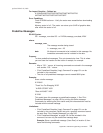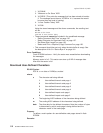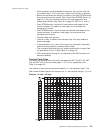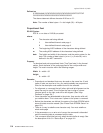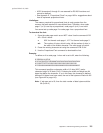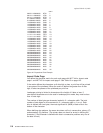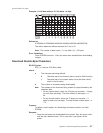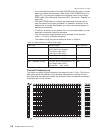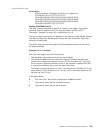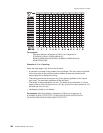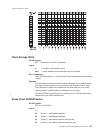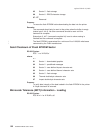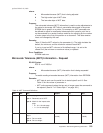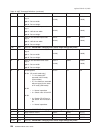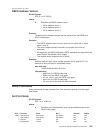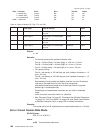For example:
Data that defines a character at X'8141' as a large box is:
X’1B;28;00;01;81;41;FF;FF;FF;FF;FF;FF;
C0;00;03;C0;00;03;C0;00;03;C0;00;03;C0;00;03;C0;00;03;
C0;00;03;C0;00;03;C0;00;03;C0;00;03;C0;00;03;C0;00;03;
C0;00;03;C0;00;03;C0;00;03;C0;00;03;C0;00;03;C0;00;03;
C0;00;03;C0;00;03;FF;FF;FF;FF;FF;FF’
Impact Printhead (s=1)
The width of these characters is always 16. However, the height of the impact
printhead, which is defined by MCT #1 (see “Microcode Tolerance (MCT)
Information - Request” on page 123), is defined as 9 or 16.
The first two data bytes specify the address of the character being defined. Starting
from the third data byte, the data bytes contain the slice information. Each slice
contains two data bytes.
The printer does not check the height of the downloaded character at the time of
the image download.
Example of9x16printing:
When the code page is set for the 9x16 matrix:
v The characters are printed in one pass of the printhead.
v The characters must follow the rules of the impact printhead; the same wire
cannot fire in consecutive positions; primary (P) and secondary (S). The printer
will not check for character definition errors. If the character is defined with dots
in consecutive positions, only one of the dots will be fired.
v The height of these characters is 2.2 mm. The width of the characters is 2.7 mm
when printed at 150 half-dots per inch (15 cpi), and 3.4 mm when printed at 120
half-dots per inch (12 cpi).
In the tables below:
0 The ″don’t care″ dot positions whose data will not be printed.
. The position where the dot will not be printed.
X The position where the dot will be printed.
updated March 18, 2002
Appendix C. RS-232 Programming Information 119



